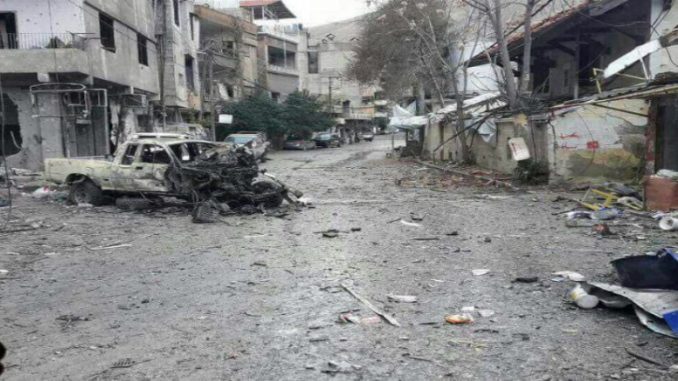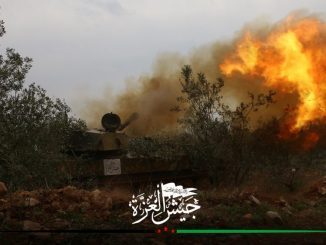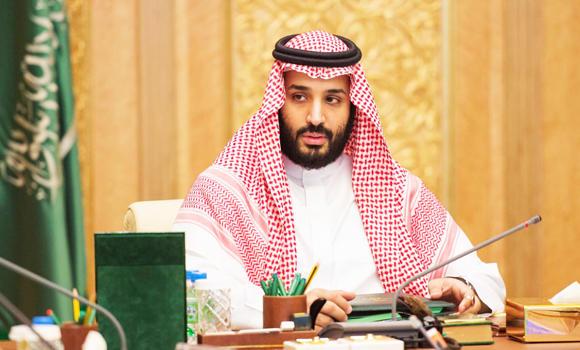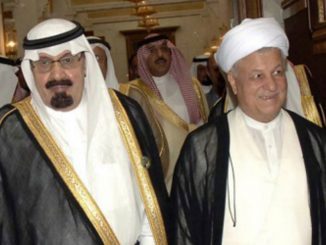
Despite a truce in Syria that came into effect on Thursday midnight, Assad regime continues its attacks on the rebels held areas, adding more tension to the region and threatening to undermine the truce agreement.
Russian President Vladimir Putin said that that Syrian opposition groups and the Syrian government had signed a number of documents including a ceasefire deal that will be guaranteed by Turkey and Russia.
The documents include a ceasefire agreement between the Syrian government and the opposition, measures to monitor the ceasefire deal and a statement on the readiness to start peace talks to settle the Syrian crisis, Putin said.
The truce, which is the third announced this year, came into effect at midnight on Thursday and follows the evacuation of Aleppo and the city’s surrender to forces loyal to Bashar al-Assad. It covers all areas of the country except those under Islamic State control.
However, Clashes and airstrikes persisted in some areas since the ceasefire began on Friday and continued on Saturday.
Hundreds flee
Assad regime’s warplanes resumed their bombardment of a rebel-held valley near Damascus on Sunday after nearly 24 hours with no air raids, a rebel official and monitors said, during the third day of a fragile ceasefire.
The area is called Barada Valley and it is the primary source of water for the capital Damascus and its surrounding region.
The Assad regime forces said some 1,300 people fled the Barada Valley region since Saturday. The region has been the target of days of air strikes and shelling despite the truce. Saturday marked the 10th day in the new offensive.
The Assad regime forces said those fleeing Barada Valley were relocated to safer areas and their names were registered by the Syrian Arab Red Crescent.
Rami Abdurrahman, who heads the Britain-based Syrian Observatory for Human Rights, said there were buses in the region ready to evacuate civilians but could not confirm how many people had left.
He said the Barada Valley region is not part of the ceasefire because of the presence of Jabhat Fateh al-Sham.
The Barada Valley Media Center said Lebanese Hezbollah fighters were firing on villages and towns in the water-rich region as Russian and government aircraft carried out raids for the 10th consecutive day Saturday.
The government assault has coincided with a severe water shortage in Damascus since December 22. Images from the valley’s Media Center indicate its Ain al-Fijeh spring and water processing facility have been destroyed in air strikes. The government says rebels spoiled the water source with diesel fuel, forcing it to cut supplies to the capital.
Rural Damascus wasn’t the only area targeted, as areas in Idlib and Aleppo countryside has been targeted too.
Still breaches to the truce are ongoing.Regime& Hizbolla militias are storming the besieged #Wadi_Barada & bombing there from ground & skies
— Lina shamy (@Linashamy) January 1, 2017
Contradicting announcements
Syrian state news agency SANA said the agreement excluded the Islamic State group, Jabhat Fateh al-Sham, the group formerly known as al-Nusra Front, and “groups linked to them”, without specifying who these groups are.
On the other hand, the rebels said that only ISIS was excluded.
Syrian rebel officials said on Thursday that the ceasefire deal included Jabhat Fateh al-Sham, formerly known as the al-Qaeda-linked Nusra Front.
Zakaria Malahifji, head of the political office of rebel group Fastaqim, also said the truce only excludes areas under the control of Islamic State.
Fastaqim’s Malahifji said: “Rebel groups said it is not about covering for (the ex-Nusra Front), but because we can’t separate them out, because the territory is overlapping.”
“We saw recently how Aleppo was annihilated because of 200 fighters from Jabhat Fatah al-Sham. This is a fundamental condition for us that no group is excluded be it Fatah al-Sham or not,” he said.
Two different papers
The rebels said it appeared the government and the opposition had signed two different versions of the ceasefire deal, one of which was missing “a number of key and essential points that are non-negotiable”, but did not say what those were. Syria
“There is a different interpretation on this ceasefire between Syrian opposition groups on the one hand and the Russians and other parties on the other,” an analyst said.
“The opposition said the ceasefire includes all Syrian factions excluding ISIL, whereas the Russians said it would exclude all UN-designated terrorist organizations including al-Nusra Front,” said Kabalan. “This [difference] is a ticking bomb that will jeopardize the whole process as the Syrian forces will go after al-Nusra and that will put the Syrian opposition factions in a very difficult position.” Syria
Excluding Jabhat Fateh al-Sham could “create some problems” and “further undermine the ceasefire’s chances of holding,” another analyst said.
The group, he said, “has a presence in areas where moderate rebel groups are operating – around Aleppo, Idlib and on the outskirts of Damascus”.
“If the Russians and the Syrian government decide to target the positions of Nusra [Jabhat Fateh al-Sham], the potential for casualties among other groups is going to be high”.
Asad regime used this confusion and continues its attacks on the areas held by the rebels since the first day of the truce.
“Continued violations by the regime and bombardment and attempts to attack areas under the control of the revolutionary factions will make the agreement null and void,” a statement signed by a number of rebel groups said.
This statement shows that the rebels may be forced to renew the fighting.
“They [Syrian rebel groups] have sent an urgent appeal to the UN and to Turkey, who is the key player in the ceasefire, to negotiate with the Russians and try to stop the Syria government from fighting, warning that if the fighting continues there will be no option but to resume the fighting,” a journalist said.
Russia seems to have played the game well, by giving the rebels a paper different from the real one, giving Assad regime the chance to continue its attacks under the term of fighting al-Nusra. At the same time, if the rebels abandon the truce and resume the fighting all the blame will fall on them for failing an international agreement they have already agreed to.
The Syrian crisis began as a peaceful demonstration against the injustice in Syria. Assad regime used to fire power and violence against the civilians and led to armed resistance. 450.000 Syrians lost their lives in the past five years according to UN estimates, and more than 12 million have lost their homes.



